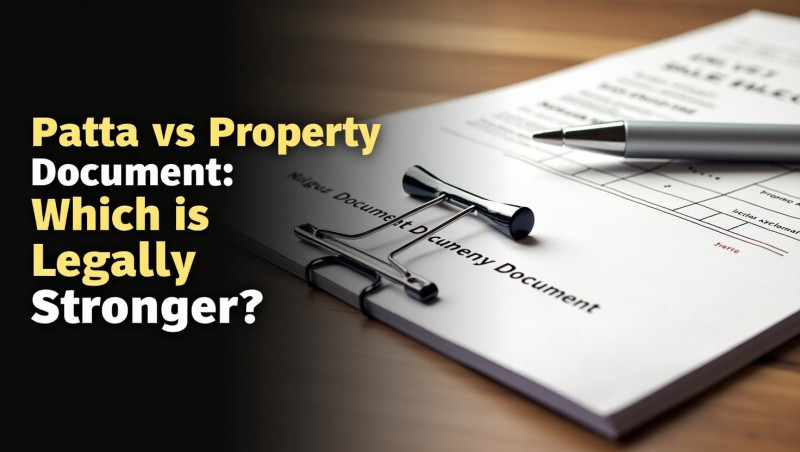- May 01, 2025
-
Patta vs. Property Document: Understanding Legal Strength and Ownership Clarity
Why This Blog Matters
Land disputes and ownership issues in India often arise from misunderstanding the difference between a Patta and a Property Document (Sale Deed). Many assume both hold equal legal weight—but that’s far from the truth. One determines legal ownership, while the other supports land administration. Let’s break it down in plain English.
What’s a Property Document (Sale Deed)?
The Sale Deed is the ultimate boss when it comes to property ownership. It’s a legally binding document that proves a transfer of ownership from the seller to the buyer. Once registered at the local sub-registrar office, it becomes indisputable proof of ownership in the eyes of Indian law.
Key Features of a Sale Deed:
- Registered under the Indian Registration Act, 1908
- Establishes legal ownership and transfer rights
- Essential for resale, inheritance, or legal claims
- Recognized by courts in property disputes
Bottom line: If you have a registered sale deed, you legally own the property—even if the Patta says otherwise.
What is a Patta?
A Patta (also called a "Record of Rights" in some states) is a document issued by the Revenue Department. It identifies who’s in possession of a specific piece of land and details like survey number, classification (wet/dry land), and extent.
Patta is important for:
- Paying land revenue taxes
- Applying for government schemes or building permits
- Verifying land classification (agricultural, residential, etc.)
Note: A Patta doesn’t grant ownership—it only reflects possession as per revenue records. The actual ownership is always backed by a registered sale deed.
Patta vs. Sale Deed – Which Holds More Legal Weight?
Here’s a quick comparison to put things into perspective:
👉 Verdict: A Sale Deed trumps the Patta in legal disputes or ownership claims. However, having both aligned in your name keeps things smooth with the authorities.
What If the Patta Is in Someone Else’s Name?
This is more common than you think! Maybe the land was sold, but the Patta wasn’t updated. Or maybe a clerical mistake occurred during registration. Here's what you need to know:
Is the Other Person the Legal Owner?
No. The registered sale deed holder is the lawful owner. Even if the Patta is still in the previous owner’s name, it does not override the sale deed.
However, mismatched Patta records can cause headaches in:
- Getting building approvals
- Applying for bank loans
- Future resale transactions
So yeah, it’s smart to get it corrected.
How to Correct a Patta Name
Here’s a step-by-step on how to fix a Patta that’s still in someone else’s name:
1. Make Sure Your Sale Deed Is Registered
First things first—ensure that the land is legally registered under your name at the sub-registrar’s office. Without this, you can’t update the Patta.
2. Apply at the RDO Office
Head to your local Revenue Divisional Officer (RDO) office and file a petition for name correction in the Patta.
3. Attach All Supporting Documents:
- Registered sale deed copy
- Aadhaar card and PAN card
- Old Patta copy (if available)
- Electricity bill or property tax receipt (for address proof)
- Encumbrance Certificate (EC) for the property
- Affidavit if required
4. Verification Process
The revenue inspector will:
- Visit the site
- Cross-verify land boundaries
- Check encumbrance and mutation status
5. Name Update in Patta
If everything checks out, your name will be updated in the official revenue records. You’ll receive an updated Patta in your name—job done!
Pro Tip: You can also apply for Patta correction online in many states like Tamil Nadu via eservices.tn.gov.in
🗝️ Key Takeaways
- The Sale Deed is your main proof of ownership.
- The Patta is a supporting document for land classification and revenue purposes.
- A Patta in another name doesn’t invalidate your ownership—but correcting it is still wise.
- Submit a correction petition at the RDO office with proper legal documents.
- Keep both documents aligned to avoid future hassles.
FAQs
Q1: Is it mandatory to have a Patta for every property in India?
Not always. Urban properties sometimes don’t have Pattas, but for agricultural and rural land, a Patta is often essential for administrative purposes.
Q2: Can I sell land without a Patta?
Yes, as long as you have a registered sale deed. However, not having a Patta might delay approvals or raise questions with buyers.
Q3: What is the difference between Patta and Encumbrance Certificate (EC)?
A Patta is a revenue record. An EC shows the transaction history of the property and confirms that it's free from legal or financial liabilities.
Q4: How long does it take to update a Patta?
Typically, 15–30 days, depending on your state and how quickly the verification process is completed.
Let’s Wrap It Up
Owning land in India comes with its share of paperwork—but understanding the difference between a Patta and a Sale Deed can save you from a ton of legal and administrative drama. While the Sale Deed proves ownership, the Patta ensures hassle-free dealings with the government.
So, if your Patta isn't in your name yet, don’t panic. Just follow the legal path, get it updated, and you’re good to go.


Comments :
Currently, there are no comments in this post. Be the first person to comment on this post.